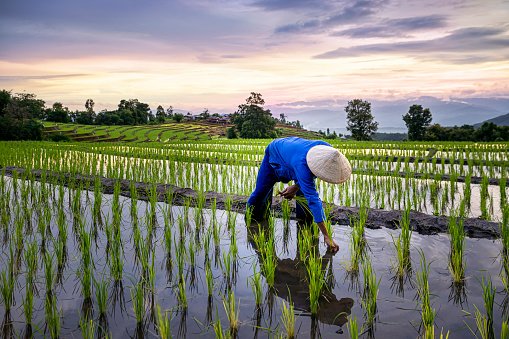Let me be straight with you. For years, my world was digital – SEO, affiliate links, and e-commerce dashboards. But the most resilient, recession-proof business model I’ve seen isn’t online. It’s in our soil.
Nigeria spends billions annually importing rice. We have the land, the climate, and the massive local demand. Building a rice farm isn’t just agriculture; it’s a strategic business move in a country hungry for self-sufficiency. It’s a tangible, vital asset in an uncertain world.
If you’re looking for a business with real roots, one that feeds a nation and builds wealth, this is it. Here’s my no-fluff, step-by-step guide, built from ground-level research and conversations with successful farmers. I’m breaking it down like a business plan, because that’s exactly what it is.
Step 1: The Mindset Shift – This is Agribusiness, Not Just Farming
Forget the old image of subsistence farming. You are launching an agricultural production company. Your crop is rice.
Your mindset must be that of a CEO. You’ll manage logistics, financing, labor, and sales. This shift is non-negotiable for success.
Step 2: Knowledge is Your First Seed
Don’t buy a single hectare until you learn. Start with research.
- Types of Rice: Understand the difference between Ofada, Faro (swamp rice), and Upland varieties. Which grows best in your target region?
- Government Programs: Agencies like the Central Bank of Nigeria (CBN) through the Anchor Borrowers’ Programme and the Federal Ministry of Agriculture have initiatives offering training, financing, and inputs. Google these. Visit their offices.
- Learn Practically: Reach out to an existing rice farm and ask to visit. Offer to volunteer for a weekend. Real-world knowledge beats any blog post (yes, even this one).
Step 3: Find Your Land and Test It
Location is everything.
- Land Selection: You need a reliable water source. Look for flat land with good drainage. Upland rice needs consistent rainfall, while swamp/Faro rice can utilize wetlands.
- Land Lease vs. Purchase: Start with a lease. It preserves capital. A 5-10 hectare lease is a realistic starting scale.
- Critical – Soil Test: This is your business’s foundation. Take soil samples to an agricultural development agency or university. The test will tell you the soil’s pH and nutrient profile, dictating what fertilizers you’ll need. Never skip this.
Step 4: Craft Your Simple Business Plan
You don’t need a 50-page document. Answer these questions clearly:
- Farm Size: How many hectares in Year 1?
- Rice Variety: What will you grow and why?
- Resources: What’s your water source? Irrigation plan?
- Cost Breakdown: Land prep, seedlings, fertilizers, pesticides, labor, milling.
- Funding: Personal savings? CBN loan? Cooperative?
- Revenue: Projected yield (tons per hectare), selling price, and total revenue.
This plan is for you and any potential financier.
Step 5: Secure Your Financing
Be realistic about costs. For a small-scale start, you need capital for land preparation, seedlings, fertilizers, and labor for at least 5 months before harvest.
- Start Small: Use personal savings to fund a pilot plot of 1-2 hectares. Prove your model.
- Explore Formal Loans: The CBN’s Anchor Borrowers’ Programme is designed for this. Approach your bank with a solid business plan.
- Cooperatives: Join or form a farmers’ cooperative. They offer group bargaining power for inputs and loans.
Step 6: Land Preparation and Planting
This is where the work begins.
- Clear and Plough: Clear the land of weeds and stumps. Plough and harrow to get a fine, level seedbed.
- Source Quality Seeds: Get certified, improved seeds from a reputable source like the National Agricultural Seeds Council. Don’t use random market rice.
- Choose Your Method: You can do direct seeding (broadcasting) or transplant seedlings from a nursery. Transplanting often gives better yields and weed control.
Step 7: Farm Management – Your Day-to-Day Operations
Rice farming is not a “plant and forget” business.
- Water Management: This is critical. Ensure consistent water, especially during flowering.
- Weed Control: Weeds are your biggest competitor. Plan for manual weeding or safe herbicide use.
- Fertilizer Application: Apply based on your soil test results. Top dressing at the right growth stages boosts yield massively.
- Pest & Disease Control: Monitor your field. Look for signs of stem borers, birds, or diseases like blast. Use integrated pest management strategies.
Step 8: Harvesting, Processing, and Selling
Your payday.
- Harvest: Harvest when 80-85% of the grains are mature. You can use cutlasses or hire a combined harvester for large plots.
- Threshing & Drying: Separate the grain from the stalk. Dry thoroughly on clean tarps or concrete to reduce moisture content. Poor drying leads to mold and spoilage.
- Milling: You can transport paddy rice to a commercial mill. For higher profit margins, consider partnering on or acquiring small milling equipment later.
- Your Market: Your product sells itself. Sell to local markets, rice merchants, or through your cooperative. Building a direct local consumer base (packaging under your own brand) is the ultimate goal for maximum profit.
FAQs (The Real Questions You’re Asking)
How profitable is a rice farm in Nigeria?
Profitability is a function of yield and cost management. With good practices, you can achieve 3-5 tons per hectare. After costs, the profit margin can be strong and scalable. The key is controlling your input costs and maximizing yield.
What are the biggest risks?
Flooding, drought, pest outbreaks, and theft. Mitigate these with good site selection, insurance where possible, secure fencing, and proactive farm management.
How much do I need to start?
For a modest 5-hectare upland rice farm, a realistic starting budget is between ₦1.5 – ₦3 million for the first cycle, covering land lease, preparation, inputs, and labor. You can start much smaller to learn.
Conclusion
In a digital age, there’s a unique power in building something physical and essential. A rice farm is more than a business; it’s food security, it’s employment, it’s a legacy asset that appreciates.
The journey from seedling to harvest mirrors any entrepreneurial venture: it requires planning, capital, daily effort, and resilience against unforeseen challenges. But the reward – building a brand that literally nourishes your community – is unmatched.
So, the question isn’t just about finding the right land or seed variety. It’s this: Are you ready to trade the volatility of online algorithms for the fundamental cycle of growth, and build a business rooted in what people need every single day?





GIPHY App Key not set. Please check settings